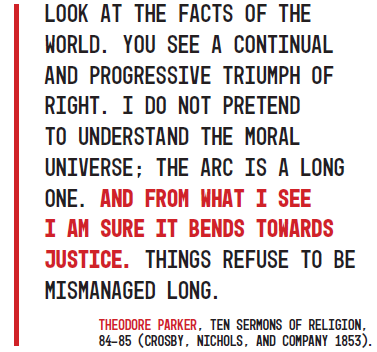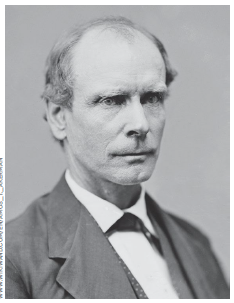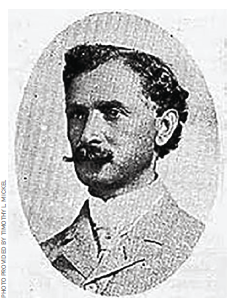Bending the Arc: Georgia Lawyers in the Pursuit of Social Justice
| Publication year | 2018 |
| Pages | 0026 |
Bending the Arc:
Georgia Lawyers in the Pursuit of Social Justice
Few know that lawyers and judges played a heroic and vital role in the success of the American Civil Rights Movement. In fact, legal and judicial efforts securing human and civil rights extend beyond that period and span the entirety of our nation's existence. Not surprisingly, Georgia lawyers have been front and center in those efforts. This article highlights a few hidden legal figures whose professional contributions deserve recognition.
BY DERRICK ALEXANDER POPE

Author's note: Throughout this article, African-American citizens are referred to by the now-antiquated terms "colored" and "Negro." They are used here to reflect the historical periods when these terms were common.
One was a former colonel in the Confederate Army who would become a forceful advocate for equality in private practice and as attorney general of the United States. Another would be among the first of his racial kinfolk to appear before the U.S. Supreme Court in a case that would lay the foundation for a number of constitutional safeguards. Still, two others would distinguish themselves as defenders of the most sacred elements of our nation's founding principles: one as a judge on the federal bench, and the other in courtrooms throughout the state.
Each of these lawyers—and many more like them—should be household names. Their valiant contributions to the betterment of society ought to be as common to the everyday citizen as they are within segments of the legal community. Despite being at the forefront of the historical efforts to make ours a more perfect union, the historical record too often omits the roles that lawyers and judges have played in that pursuit.
Nowhere is this truer than in the grand cause of securing, protecting and advancing human and civil rights. Whether as advocates or jurists, as counselors or intermediaries, lawyers were indispensable to the

"Partiality and injustice breed discontent. Let us then be instructed by bitter experience. Let us abandon all absolute dogmas and unseasonable sentiments. Let us recognize truth even when in variance with our prepossessions."
—Amos T. Akerman
American Civil Rights movement, providing a contribution of such magnitude that one scholar dubbed it "the first revolution in history conducted on advice of counsel."[1]
Indeed, "lawyers have bent that arc of the universe towards justice,"[2] and Georgia practitioners have time and again stood at the epicenter of the legal strides such an undertaking requires. A roll call of such luminaries and the transformative impact of their professional contributions to society could fill the pages of this Journal . Let the profile of four monumental figures, however, serve as an introduction to the role Georgia lawyers have played in bending that arc.
Amos T. Akerman
Amos Tappan Akerman was born Feb. 23, 1821, in Portsmouth, N.H., moving to Savannah in 1846 as a tutor in the home of Sen. John McPherson.[3] He would study law in the senator's library and was admitted to the Georgia Bar in 1850.[4] He made his living as both an attorney and a farmer, at one point owning 11 slaves. Although he opposed secession as the outbreak of Civil War neared, Akerman served in the Confederate Army, attaining the rank of colonel.[5]
After the war, Akerman joined the Republican Party and was "among the most influential leaders in the work" of the convention that crafted Georgia's 1868 Constitution.[6] Rivals accused him of supporting the opposition candidate in that year's bitter presidential contest, and he would write a letter to the New York Times to dispose of the rumors.[7] Akerman also used the occasion as a forum to advocate for equal political and civil rights.
In his letter, the tempo of his argument began with a sober assessment of the confederate government and the Civil War. "In 1861, we embarked in a bold political adventure, which was soon followed by a voluntary resort of arms . . . with a chance of victory . . . and the risk of defeat."[8] With "the fortunes of war compelling surrender," he described how the spirit of resentment and revenge—"improper at all times [and] peculiarly unbecoming now"—permeated the contentious aftermath of the war.[9] Akerman laid out the cause and consequence of that spirit in the starkest of terms, saying, "[w]e gave up the Confederate Government. We gave up slavery."[10]
Recognizing that a new government would soon be formed, Akerman made a compelling case for extending the right to vote to the newly emancipated:
There is no reason why a colored voter should not seek the welfare of the country to which he has so many ties. The ends to be sought by good white men and good black men, in the act of voting, are precisely the same. Both want good laws and a good administration of them.[11]
Akerman rounded out his thoughts on the matter by concluding that "the most important view is this; that the abolition of all political distinctions founded on color will remove, effectually and forever, all danger of a conflict of races."[12]This sentiment would carry over into his time in private practice where the litigation of the reconstruction period had begun to shift "from the enforcement of technicalities toward the administration of justice on broader principles of equity and a sense of right."[13] The most noteworthy example of this shift involved a lawsuit tailor-made for Akerman and the Supreme Court of Georgia to outfit themselves in the "courage to break away from old forms and precedents."[14]
White v. Clements presented an issue of first impression, namely "the right of persons of color to hold office in this State."[15] Richard W. White was elected clerk of the Superior Court of Chatham

County in April 1868. His opponent, William Clements, challenged the outcome, claiming that he was eligible to hold the seat "because he was not a person of color, and did not have in his veins any African or negro blood."[16]The lower court agreed and held that a person of color was ineligible to hold office.[17]
Akerman, who by then had earned the distinction of being "the best Republican lawyer in the state," took up the appeal.[18]Both he and Justice Henry Kent McCay, who authored the opinion, were influential in the state constitutional convention, which no doubt prompted the salient viewpoint that:
The people of Georgia, without distinction of color, came together at Atlanta in December, 1867, by their delegates, to form for themselves a Constitution and frame a government, men of both colors sat as delegates . . . and yet it is now contended that the rights guaranteed by that Constitution, stand as to the two colors, on a different footing, that as to the white man, they are securities, but as to the negro, they are grants . . . The whole thing is absurd.[19]
Overturning the ruling of the trial court, Judge McCay held, "the fundamental law—the Constitution of the State—guarantees to men of color the right to be chosen to an office, and I put my judgment upon that ground."[20]
Akerman would later serve as attorney general of the United States, earning the distinction of being the first to head the newly created Justice Department and establishing its first investigative unit, which was the precursor to the Federal Bureau of Investigation.[21]His tenure was marked by his zealous prosecution of the Ku Klux Klan and its violent reprisals against Negro suffrage, marking him as the first in federal civil rights litigators. After leaving the Justice Department, Akerman lived the remainder of his life in Cartersville until his death in 1880.
Noah Parden
He was holding his mother's hand when she died. Neighbors were unsure of what to do with the six year old, so they sent him to an orphanage with only a few toys, some clothes and a Bible his mother had given him for Christmas.[22] This was a rather inauspicious beginning for someone who would become a principal figure in one of the most important cases in the history of the U.S. Supreme Court.
Noah Walter Parden was born in Floyd County, Ga., around 1865; his mother, a former slave, his father, a white man he never knew. At 19, he would move to Chattanooga, Tenn., where he was a student at Howard High School, supporting himself as a barber.[23] At graduation, he spoke on the topic of "The Duty of a Citizen."[24] He went on to attend Central Tennessee College of Law, finishing at the top of his class in 1893.[25]
By age 41, Parden had become one of the most successful black lawyers in Chattanooga. He was a "law-school-trained attorney," which made his grasp of the Constitution, statutes and precedent "far superior to many of his colleagues."[26]His skills in the courtroom led to several victories against insurance companies who made it a practice to deny claims to black policyholders. Parden would impress upon the all-white juries that if big companies would take advantage of black customers, pretty soon they would begin to cheat their white ones.[27] His training, his courtroom acumen and his standing in the community were the combined factors that led to Parden taking the lead in a case that resulted in a landmark U.S. Supreme Court decision.
In 1906, Ed Johnson was arrested, tried, convicted, lynched and buried all within a dizzying span of 55 days from when he was falsely accused of raping a white woman.[28] From the time of his arrest on through his trial, Johnson would be threatened with vigilantism. At one point, a mob stormed the jail demanding that he be turned over to them.[29] In one of the more bizarre aspects of the trial, a juror was permitted to direct the defendant to put on an article of clothing the

"We are at a time when many . . . have abandoned the respect for the...
To continue reading
Request your trial
